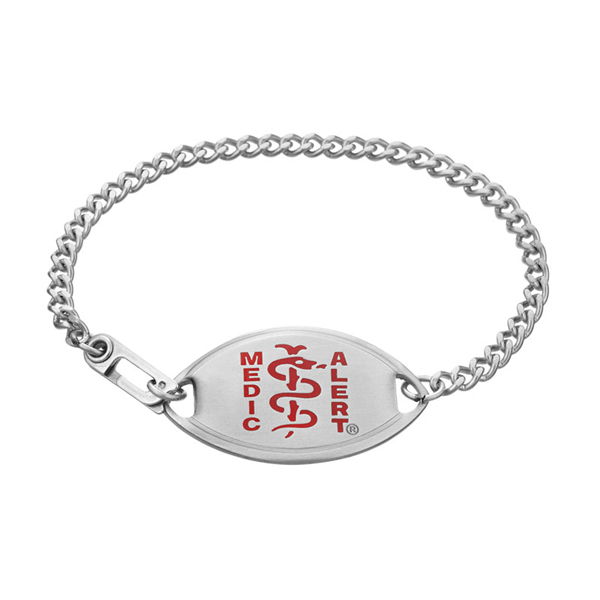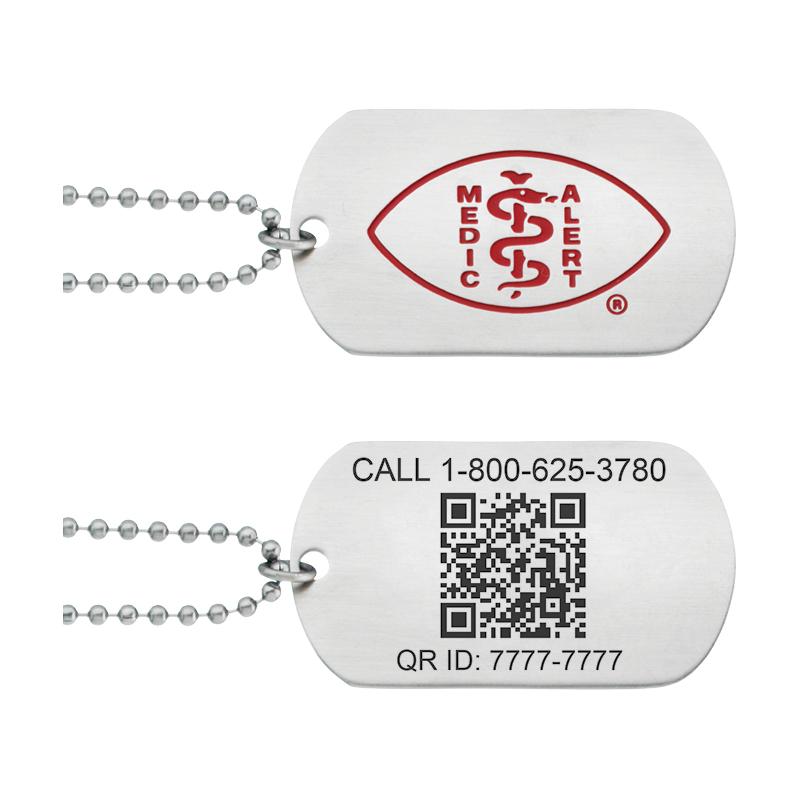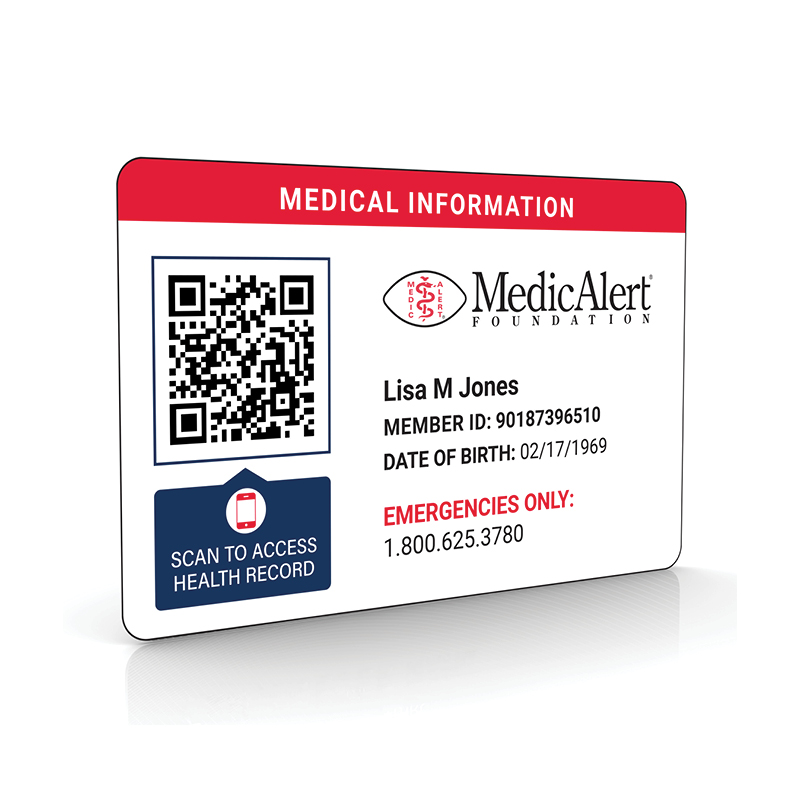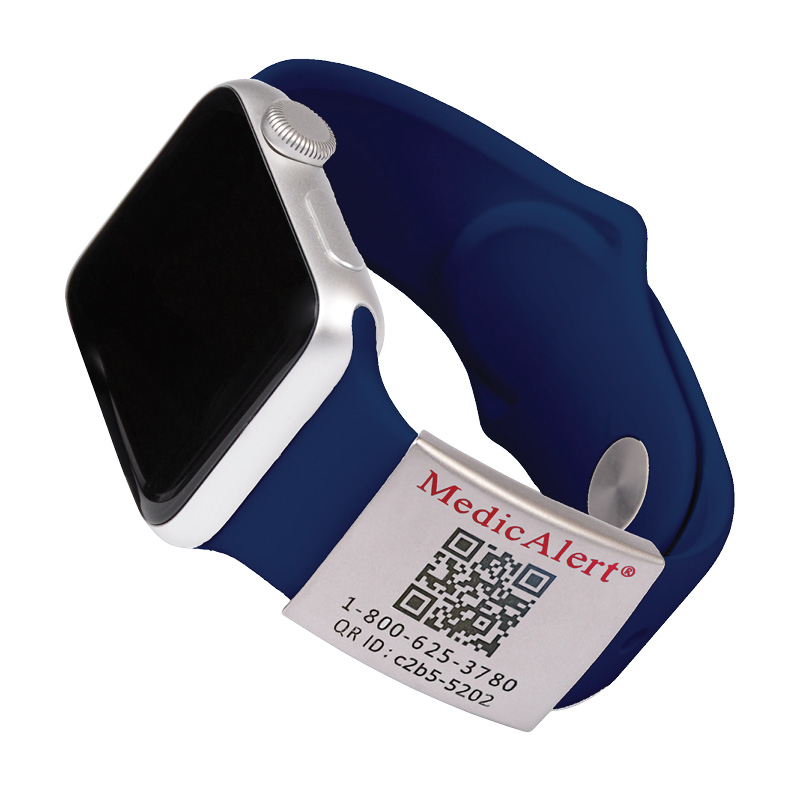Beyond bracelets, there’s a world of other options for medical ID, and as technology evolves, so does the list of options. Traditional IDs are wearable jewelry, with bracelets and necklaces as the most popular types. But jewelry is not for everyone. Younger children and children with autism or sensory disorders can have a problem with an ever-present bracelet; so can elderly adults with dementia or other cognitive challenges. Here are some alternatives:
Necklaces: Medical ID necklaces can range from utilitarian to fashion-forward, and there are style options available for men, women, and children. Like bracelets, necklaces can be made from a number of different materials or combinations of materials, such as stainless steel, sterling silver, gold, or platinum. MedicAlert necklaces come in a variety of chain and emblem styles, and also offer different color options for the engraving.
Medical IDs for Apple Watches: Apple Watches have become popular among all age groups, and since they are such an easily-accessible resource for all kinds of information, MedicAlert developed ID specifically for them, as an alternative to traditional ID jewelry. Although they are considered wearable, these attachable tags slide onto the silicone band of an Apple Watch, so they don’t require the addition of an entirely new piece of jewelry. The engravable tags are made of water- and rust-proof stainless steel, designed to attach securely to Apple Watch bands. They are available in multiple colors and several size options for compatibility with different sizes of Apple Watches.
Smart IDs: If bracelets and necklaces are the analog versions of medical ID, Smart IDs bring medical ID into the digital age. MedicAlert’s Smart IDs are available in two forms: Smart Medical ID Cards and MedicAlert ICE Tags. Both options use proven, scannable QR code technology for fast, easy access to your full health profile. Scanning the unique QR code on either type of Smart ID with a smartphone camera opens up critical information, including medical conditions, allergies, medications, vaccinations, and more.
MedicAlert’s Smart Medical ID Card is credit card-sized and easily carried with you in a wallet or pocket. MedicAlert ICE Tags come in a set of four durable vinyl stickers that adhere securely to any hard surface – think cellphone cases, bicycle or motorcycle helmets, and mobility aids – typical objects that travel with you. Each set of four tags has a unique QR code for one person, so they can be attached to multiple objects. Additional users would need their own individual set of sticker tags.
The portability and scope of personal medical information they provide make Smart IDs a great alternative to traditional jewelry and wearable IDs, not just in emergency situations, but also for doctor visits, home healthcare providers, or for access by other caregivers. Because they are digitally linked to your MedicAlert full profile, your information is automatically updated with any changes to your profile.
Shoe Tags, Wallet Cards, Seatbelt ID Holders: These medical ID variations are perfect for individuals for whom any wearable ID is not a good option, such as very young children and seniors with strength limitations or cognitive issues. MedicAlert Shoe Tags are engravable and available in two different designs for easy and secure attachment to lace-up and other types of shoes. If digital tech is too high-tech for the user, MedicAlert Fillable Wallet Cards are the manual alternative to Smart ID cards. Personal medical information and MedicAlert ID numbers are written by the owner or caregiver into the foldable card and must be physically updated when information changes. Like Smart ID cards, Fillable Wallet Cards are credit card-sized for portability, but unlike Smart IDs, the information is not digitally linked to a health profile.
Seatbelt ID Holders are another type of non-wearable, non-digital medical ID. They offer the same benefits as shoe tags but are much more versatile. Although they’re called seatbelt holders, they can be securely attached not only to seatbelts, but to backpack straps, handbags, child car seats, bike frames, or mobility aids, like a walker or wheelchair. They attach firmly to any of these with a secure, adjustable Velcro closure.
MedicAlert Seatbelt ID Holders are a highly visible, bright-red color with the words “Medical Info Inside” in large letters on the front and a back pocket that holds an ID card or other medical document, such as a vaccination card. Either one of MedicAlert’s Medical ID cards (Smart or traditional) fits right into the pocket of the seatbelt holder, giving users the best of both digital and non-wearable ID styles. If you or someone you care for is a senior who could benefit from the protection of MedicAlert ID but is reluctant to wear it, the seatbelt holder is a great alternative.




